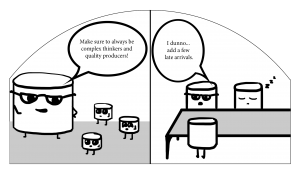Letter to the Editor: District 203’s Director of Communications details process for survey response
April 11, 2017
Editor’s note: An excerpt of this letter is featured in the April edition of the Central Times. Due to spacing, the entire letter could not be fit. The CT has published the entire letter below.
At Naperville 203, we consider ourselves fortunate to have high-quality high school newspapers run by earnest, hard-working student journalists. When you cover major school district initiatives, it makes us proud. We are proud that our students are involved, astute and aware. Everyone is entitled to their opinion, and we welcome the feedback. However, in the spirit of journalistic integrity, we find it necessary to respond to the editorial in the Central Times titled: “Weekly late starts good for teachers, now do something for students,” posted March 27, 2017.
Research into the reasoning behind the recommendation for weekly late starts would have served the Central Times editorial staff well, and would have resulted in a better-informed editorial on this topic. This information is, and has been, available on the Naperville 203 website in numerous places, has been presented at several Board of Education meetings and in community forums (one held at Naperville Central), all of which were recorded and available for view on the school district website. Also, school district administrators, like the Director of Communications, would be happy to have been interviewed on the topic.
Thank you for allowing us to this forum to present the facts that can shed a light on the process, reasoning and recommendation.
In 2014, we created a strategic blueprint, Focus 2020, which guides school district work through the year 2020. The blueprint has a commitment which tasks school district administrators to examine how to best structure the time in the school day and year: “Conduct a thorough analysis of how to best structure time in the school day and school year to maximize student learning and professional collaboration.”
To complete part of this commitment, a research work group – comprised of school district-level and school-based administrators, teachers and teacher’s union leadership – met six times over the course of the 2015-2016 school year to discuss school day and school year.
In these meetings, research was reviewed on extended day and year, and the group reviewed current state of Naperville 203 student and staff school days at each grade level, discussing the benefits and challenges of the current state as well as how the desired state would look.
Research for discussion in the work group included studies by the American Academy of Pediatrics and the Centers for Disease Control – both state that later start times would benefit adolescents. A local pediatrician also addressed the work group and further emphasized the American Academy of Pediatrics policy statement on adolescent school start times. The school district research group concluded that younger students could benefit from additional instructional time each day, and older students could benefit from starting school later. They also concluded that students and staff could benefit from more collaboration time at the secondary level.
In October 2016, we conducted our School Calendar and School Day Survey (School Day Survey). Those surveyed (teachers, students, parents, community members) told us that students’ health and academic performance should be top considerations in making any changes to the school day schedule. More than 14,680 people participated in the survey. 4,600 of survey respondents were our students (6-12 grade).
To gain even more insight into the survey findings, we held two Focus 203 community engagement sessions regarding the survey results on November 11, 2016. In that presentation, the number one key finding presented was as follows: “Students’ health and sleep received the highest weighted score and students’ academic performance received the second highest weighted score overall as the most important factors to consider for a preferred school schedule.”
A presentation to the Board of Education on January 9, 2017 also shared this key finding.
The assertion that the school district “conveniently omitted” data from the survey regarding support for daily late start in the March 6th Board of Education presentation is false. This information was not germain to the topic regarding the recommendation for weekly late start days for Professional Learning Communities (PLC). The Board of Education, as well as the school district community have access to the results, including the full survey report, through the many presentations and discussions held and referenced above.
The discussion on how to shape the school day continues. The blueprint commitment for school day is a 2018 commitment. Work is still yet to be done and the late start for PLC is one step toward a solution.
We love our Ranch View Rangers, and appreciate your use of their school themes. Let us apply these themes to the work done at and for our schools each day as you have challenged us to Got Grit? Sure do. Naperville 203 teachers and administration spent many months working on the research and preliminary recommendations for the school day. And, the work continues, which brings us to: The Power of Yet – it’s powerful, in fact we are still reviewing research on the benefits of late start and its effectiveness prior to making any further changes. And, finally Flexible Thinking – allows us to pull together many of our talented and knowledgeable teachers and administrators to collaborate on how to do what’s best for students, reaching out to the school district community and weighing the many pros and cons of proposed solutions.
To be sure, it’s not an easy task. There are several challenges to implement a daily late start, or another solution, but our work is not done. We have certainly not given up nor are we ignoring the survey responses. There are logistical and cost challenges to consider for daily late start, but not “hassles.” Scheduling busses, cost of transportation, impact on instruction, impact on athletics and other co-curricular activities are among the challenges mentioned in the survey, and in the feedback from our Focus 203 community engagement sessions.
Ultimately, the weekly late starts for teacher professional collaboration time is not the easy way out, does not ignore survey results, nor is it hypocritical. This plan for weekly late start times did not begin eight years ago, as was stated by “administration” quoted in your editorial, but was determined through the work of the aforementioned research group, stakeholder feedback and school district administration.
We agree, this is a good start. It is a work in progress. We make change deliberately and intentionally at Naperville 203. This process takes time. We will continue to be receptive to feedback from all in Naperville 203, especially our students, who are the driving force behind all that we do.
Sincerely,
Ms. Michelle Fregoso
Director of Communications
Naperville Community Unit School District 203







